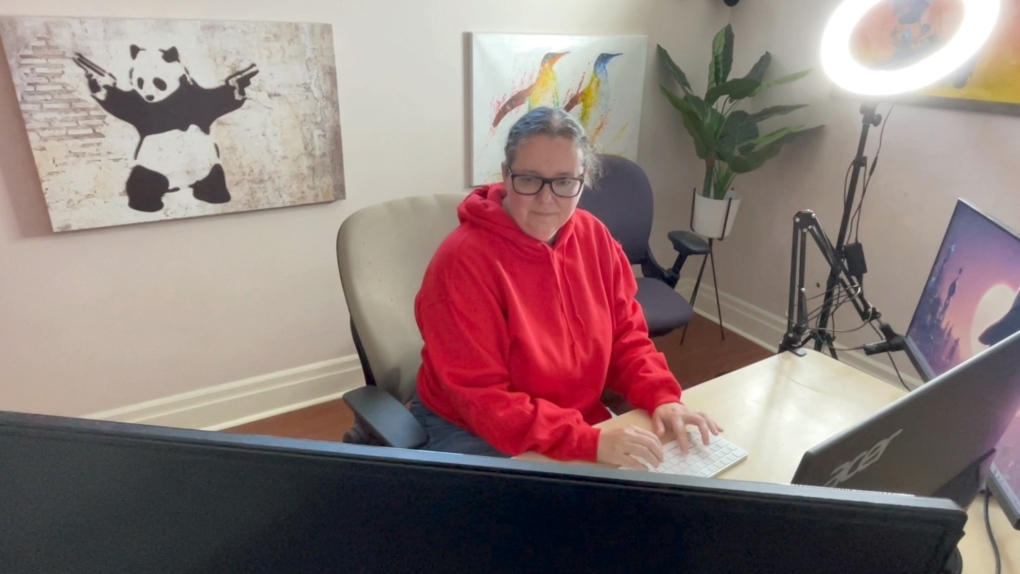New voice cloning technology allows scammers to impersonate anyone
 Artificial intelligence expert Marie Haynes says AI tools will soon make it difficult to distinguish AI from a real person's voice. (Dave Charbonneau/CTV News Ottawa)
Artificial intelligence expert Marie Haynes says AI tools will soon make it difficult to distinguish AI from a real person's voice. (Dave Charbonneau/CTV News Ottawa)
As artificial intelligence technology continues to advance, scammers are finding new ways to exploit it.
Voice cloning has emerged as a particularly dangerous tool, with scammers using it to imitate the voices of people their victims know and trust in order to deceive them into handing over money.
"People will soon be able to use tools like ChatGPT or even Bing and eventually Google, to create voices that sound very much like their voice, use their cadence," said Marie Haynes, an artificial intelligence expert. "And will be very, very difficult to distinguish from an actual real live person."
She warns that voice cloning will be the new tool for scammers who pretend to be someone else.
Carmi Levy, a technology analyst, explains that scammers can even spoof the phone numbers of family and friends, making it look like the call is actually coming from the person they are impersonating.
"Scammers are using increasingly sophisticated tools to convince us that when the phone rings it is in fact coming from that family member or that significant other. That person that we know," he says.
Levy advises people who receive suspicious calls to hang up and call the person they think is calling them directly.
"If you get a call and it sounds just a little bit off, the first thing you should do is say 'Okay, thank you very much for letting me know. I'm going to call my grandson, my granddaughter, whoever it is that you're telling me is in trouble directly.' Then get off the phone and call them," he advises.
Haynes also warns that voice cloning is just the beginning, with AI powerful enough to clone someone's face as well.
"Soon, if I get a FaceTime call, how am I going to know that it's legitimately somebody that I know," she says. "Maybe it's somebody pretending to be that person."
As this technology becomes more widespread, experts are urging people to be vigilant and to verify calls from friends and family before sending any money.
"There are all sorts of tools that can take written word and create a voice out of it," says Haynes. "We are soon going to be finding that scam calls are going to be really, really on the rise."
CTVNews.ca Top Stories

Most Canadians have heard about Freeland's resignation from Trudeau cabinet, new poll finds
The majority of Canadians heard about Chrystia Freeland's surprise resignation from Prime Minister Justin Trudeau's cabinet, according to a new poll from Abacus Data released Tuesday.
BREAKING 2 B.C. police officers charged with sexual assault
Two officers with a Vancouver Island police department have been charged with sexual assault, authorities announced Tuesday.
Canadian government announces new border security plan amid Donald Trump tariff threats
The federal government has laid out a five-pillared approach to boosting border security, though it doesn't include specifics about where and how the $1.3-billion funding package earmarked in the fall economic statement will be allocated.
B.C. teacher disciplined for refusing to let student use bathroom
A teacher who refused to let a student use the bathroom in a B.C. school has been disciplined by the province's professional regulator.
Wine may be good for the heart, new study says, but experts aren’t convinced
Drinking a small amount of wine each day may protect the heart, according to a new study of Spanish people following the plant-based Mediterranean diet, which typically includes drinking a small glass of wine with dinner.
Police chief says motive for Wisconsin school shooting was a 'combination of factors'
Investigators on Tuesday are focused on trying to determine a motive in a Wisconsin school shooting that left a teacher and a student dead and two other children in critical condition.
After investigating Jan. 6, House GOP sides with Trump and goes after Liz Cheney
Wrapping up their own investigation on the Jan. 6 2021 Capitol attack, House Republicans have concluded it's former GOP Rep. Liz Cheney who should be prosecuted for probing what happened when then-President Donald Trump sent his mob of supporters as Congress was certifying the 2020 election.
Fall sitting bookended by Liberal byelection losses ends with Trudeau government in tumult
The House of Commons adjourned on Tuesday, bringing an end to an unstable fall sitting that has been bookended by Liberal byelection losses. The conclusion of the fall sitting comes as Prime Minister Justin Trudeau's minority government is in turmoil.
The world's busiest flight routes for 2024 revealed
If you think planes have got fuller and the skies busier over the past year, you’d be right — especially if you live in either Hong Kong or Taipei.

































